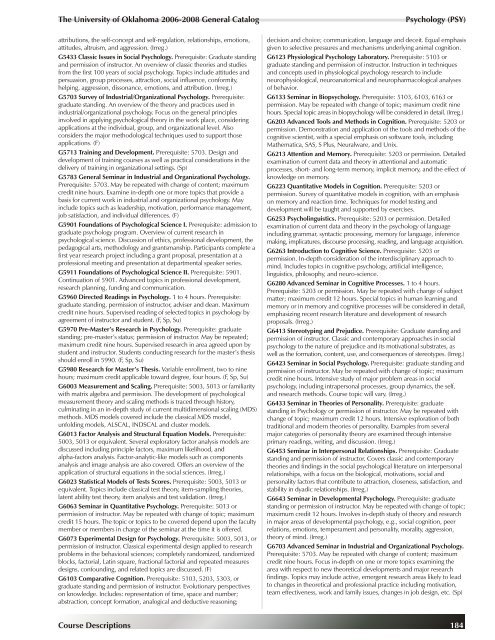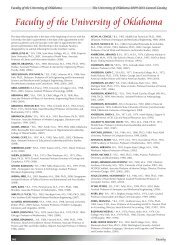2006-08 Course Descriptions - Catalog - University of Oklahoma
2006-08 Course Descriptions - Catalog - University of Oklahoma
2006-08 Course Descriptions - Catalog - University of Oklahoma
Create successful ePaper yourself
Turn your PDF publications into a flip-book with our unique Google optimized e-Paper software.
The Uni ver sity <strong>of</strong> <strong>Oklahoma</strong> <strong>2006</strong>-20<strong>08</strong> Gen eral Cat a logPsychology (PSY)attributions, the self-concept and self-regulation, relationships, emotions,attitudes, altruism, and aggression. (Irreg.)G5433 Classic Issues in Social Psychology. Prerequisite: Graduate standingand permission <strong>of</strong> instructor. An overview <strong>of</strong> classic theories and studiesfrom the first 100 years <strong>of</strong> social psychology. Topics include attitudes andpersuasion, group processes, attraction, social influence, conformity,helping, aggression, dissonance, emotions, and attribution. (Irreg.)G5703 Survey <strong>of</strong> Industrial/Organizational Psychology. Prerequisite:graduate standing. An overview <strong>of</strong> the theory and practices used inindustrial/organizational psychology. Focus on the general principlesinvolved in applying psychological theory in the work place, consideringapplications at the individual, group, and organizational level. Alsoconsiders the major methodological techniques used to support thoseapplications. (F)G5713 Training and Development. Prerequisite: 5703. Design anddevelopment <strong>of</strong> training courses as well as practical considerations in thedelivery <strong>of</strong> training in organizational settings. (Sp)G5783 General Seminar in Industrial and Organizational Psychology.Prerequisite: 5703. May be repeated with change <strong>of</strong> content; maximumcredit nine hours. Examine in-depth one or more topics that provide abasis for current work in industrial and organizational psychology. Mayinclude topics such as leadership, motivation, performance management,job satisfaction, and individual differences. (F)G5901 Foundations <strong>of</strong> Psychological Science I. Prerequisite: admission tograduate psychology program. Overview <strong>of</strong> current research inpsychological science. Discussion <strong>of</strong> ethics, pr<strong>of</strong>essional development, thepedagogical arts, methodology and grantsmanship. Participants complete afirst year research project including a grant proposal, presentation at apr<strong>of</strong>essional meeting and presentation at departmental speaker series.G5911 Foundations <strong>of</strong> Psychological Science II. Prerequisite: 5901.Continuation <strong>of</strong> 5901. Advanced topics in pr<strong>of</strong>essional development,research planning, funding and communication.G5960 Directed Readings in Psychology. 1 to 4 hours. Prerequisite:graduate standing, permission <strong>of</strong> instructor, adviser and dean. Maximumcredit nine hours. Supervised reading <strong>of</strong> selected topics in psychology byagreement <strong>of</strong> instructor and student. (F, Sp, Su)G5970 Pre-Master’s Research in Psychology. Prerequisite: graduatestanding; pre-master’s status; permission <strong>of</strong> instructor. May be repeated;maximum credit nine hours. Supervised research in area agreed upon bystudent and instructor. Students conducting research for the master’s thesisshould enroll in 5990. (F, Sp, Su)G5980 Research for Master’s Thesis. Variable enrollment, two to ninehours; maximum credit applicable toward degree, four hours. (F, Sp, Su)G6003 Measurement and Scaling. Prerequisite: 5003, 5013 or familiaritywith matrix algebra and permission. The development <strong>of</strong> psychologicalmeasurement theory and scaling methods is traced through history,culminating in an in-depth study <strong>of</strong> current multidimensional scaling (MDS)methods. MDS models covered include the classical MDS model,unfolding models, ALSCAL, INDSCAL and cluster models.G6013 Factor Analysis and Structural Equation Models. Prerequisite:5003, 5013 or equivalent. Several exploratory factor analysis models arediscussed including principle factors, maximum likelihood, andalpha-factors analysis. Factor-analytic-like models such as componentsanalysis and image analysis are also covered. Offers an overview <strong>of</strong> theapplication <strong>of</strong> structural equations in the social sciences. (Irreg.)G6023 Statistical Models <strong>of</strong> Tests Scores. Prerequisite: 5003, 5013 orequivalent. Topics include classical test theory, item-sampling theories,latent ability test theory, item analysis and test validation. (Irreg.)G6063 Seminar in Quantitative Psychology. Prerequisite: 5013 orpermission <strong>of</strong> instructor. May be repeated with change <strong>of</strong> topic; maximumcredit 15 hours. The topic or topics to be covered depend upon the facultymember or members in charge <strong>of</strong> the seminar at the time it is <strong>of</strong>fered.G6073 Experimental Design for Psychology. Prerequisite: 5003, 5013, orpermission <strong>of</strong> instructor. Classical experimental design applied to researchproblems in the behavioral sciences; completely randomized, randomizedblocks, factorial, Latin square, fractional factorial and repeated measuresdesigns, confounding, and related topics are discussed. (F)G6103 Comparative Cognition. Prerequisite: 5103, 5203, 5303, orgraduate standing and permission <strong>of</strong> instructor. Evolutionary perspectiveson knowledge. Includes: representation <strong>of</strong> time, space and number;abstraction, concept formation, analogical and deductive reasoning;decision and choice; communication, language and deceit. Equal emphasisgiven to selective pressures and mechanisms underlying animal cognition.G6123 Physiological Psychology Laboratory. Prerequisite: 5103 orgraduate standing and permission <strong>of</strong> instructor. Instruction in techniquesand concepts used in physiological psychology research to includeneurophysiological, neuroanatomical and neuropharmacological analyses<strong>of</strong> behavior.G6133 Seminar in Biopsychology. Prerequisite: 5103, 6103, 6163 orpermission. May be repeated with change <strong>of</strong> topic; maximum credit ninehours. Special topic areas in biopsychology will be considered in detail. (Irreg.)G6203 Advanced Tools and Methods in Cognition. Prerequisite: 5203 orpermission. Demonstration and application <strong>of</strong> the tools and methods <strong>of</strong> thecognitive scientist, with a special emphasis on s<strong>of</strong>tware tools, includingMathematica, SAS, S Plus, Neuralware, and Unix.G6213 Attention and Memory. Prerequisite: 5203 or permission. Detailedexamination <strong>of</strong> current data and theory in attentional and automaticprocesses, short- and long-term memory, implicit memory, and the effect <strong>of</strong>knowledge on memory.G6223 Quantitative Models in Cognition. Prerequisite: 5203 orpermission. Survey <strong>of</strong> quantitative models in cognition, with an emphasison memory and reaction time. Techniques for model testing anddevelopment will be taught and supported by exercises.G6253 Psycholinguistics. Prerequisite: 5203 or permission. Detailedexamination <strong>of</strong> current data and theory in the psychology <strong>of</strong> languageincluding grammar, syntactic processing, memory for language, inferencemaking, implicatures, discourse processing, reading, and language acquisition.G6263 Introduction to Cognitive Science. Prerequisite: 5203 orpermission. In-depth consideration <strong>of</strong> the interdisciplinary approach tomind. Includes topics in cognitive psychology, artificial intelligence,linguistics, philosophy, and neuro-science.G6280 Advanced Seminar in Cognitive Processes. 1 to 4 hours.Prerequisite: 5203 or permission. May be repeated with change <strong>of</strong> subjectmatter; maximum credit 12 hours. Special topics in human learning andmemory or in memory and cognitive processes will be considered in detail,emphasizing recent research literature and development <strong>of</strong> researchproposals. (Irreg.)G6413 Stereotyping and Prejudice. Prerequisite: Graduate standing andpermission <strong>of</strong> instructor. Classic and contemporary approaches in socialpsychology to the nature <strong>of</strong> prejudice and its motivational substrates, aswell as the formation, content, use, and consequences <strong>of</strong> stereotypes. (Irreg.)G6423 Seminar in Social Psychology. Prerequisite: graduate standing andpermission <strong>of</strong> instructor. May be repeated with change <strong>of</strong> topic; maximumcredit nine hours. Intensive study <strong>of</strong> major problem areas in socialpsychology, including intrapersonal processes, group dynamics, the self,and research methods. <strong>Course</strong> topic will vary. (Irreg.)G6433 Seminar in Theories <strong>of</strong> Personality. Prerequisite: graduatestanding in Psychology or permission <strong>of</strong> instructor. May be repeated withchange <strong>of</strong> topic; maximum credit 12 hours. Intensive exploration <strong>of</strong> bothtraditional and modern theories <strong>of</strong> personality. Examples from severalmajor categories <strong>of</strong> personality theory are examined through intensiveprimary readings, writing, and discussion. (Irreg.)G6453 Seminar in Interpersonal Relationships. Prerequisite: Graduatestanding and permission <strong>of</strong> instructor. Covers classic and contemporarytheories and findings in the social psychological literature on interpersonalrelationships, with a focus on the biological, motivations, social andpersonality factors that contribute to attraction, closeness, satisfaction, andstability in dyadic relationships. (Irreg.)G6643 Seminar in Developmental Psychology. Prerequisite: graduatestanding or permission <strong>of</strong> instructor. May be repeated with change <strong>of</strong> topic;maximum credit 12 hours. Involves in-depth study <strong>of</strong> theory and researchin major areas <strong>of</strong> developmental psychology, e.g., social cognition, peerrelations, emotions, temperament and personality, morality, aggression,theory <strong>of</strong> mind. (Irreg.)G6703 Advanced Seminar in Industrial and Organizational Psychology.Prerequisite: 5703. May be repeated with change <strong>of</strong> content; maximumcredit nine hours. Focus in-depth on one or more topics examining thearea with respect to new theoretical developments and major researchfindings. Topics may include active, emergent research areas likely to leadto changes in theoretical and pr<strong>of</strong>essional practice including motivation,team effectiveness, work and family issues, changes in job design, etc. (Sp)<strong>Course</strong> <strong>Descriptions</strong> 184








